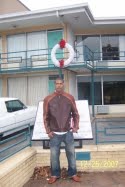Ken Camell ll
Dec 13, 2019
Afram 26 Final Essay
Prof Erica Williams
Word Count 1100
Kalief The Martyr, in a Greedy War
The year was 2010 ad, in the city of the Bronx, New York. This is the setting of where an unwilling martyr would grow to worldwide acclaim. He was just walking home from a party when he was arrested by the NYPD. He knew it had to be a misunderstanding since he hadn't done anything wrong, but little did he know that he would not return home for 3 years and
people all over the world will hear history and be amazed by his courage to stand for the truth.
The person who would soon become a martyr was a teenager named Kalief Browder. At 16 years young Kalief was accused of stealing a backpack and subsequently spent more than 1,000 days in Rikers Island Prison. Despite never being convicted of any crime Kalief spent 3 years behind bars which nearly 2 out of those 3 years he served in solitary confinement aka the box. As if that wasn't enough injustice he also was physically assaulted by fellow inmates and "correctional officers,". While Kalief was locked in solitary confinement he was often starved by the correctional guards.
While enduring all the physical and emotional abuse Kalief began to show signs of post-traumatic stress disorder as well as exhibiting suicidal behavior. Kalief attempted suicide on least 3 separate occasions. Kalief was offered a chance to go home if only he plead guilty to a lesser charge however, Kalief refused to take the deal since he was innocent.
After Kalief's robbery case was dropped due to lack of evidence he was finally released from Rikers Island. He finally had the chance to make the transition back into the free world and he quickly obtained his G.E.D and then began taking classes at the Bronx Community College. Even though he wasn’t seeking fame or notoriety he became a hero once his story received mainstream coverage. He made an appearance on the Rosie O’Donnell Show and more importantly recording artist/music mogul Jay-Z decided to be the executive producer for a
documentary focusing on Kalief's prison experience which can be summed up as 3 year long nightmare.
Despite the support Kalief was receiving from civil rights advocates and celebrities the mental and physical trauma Kalief accumulated was too much for him to bare. After several trips to the psychiatric hospital and numerous unsuccessful suicide attempts his mother found his lifeless body hanging outside his bedroom window. It's true that Kalief's suicide is tragic and it's unfortunate he did not get the chance to see how his tribulations exposed how broken The U.S prison system is.
As a direct result of Kalief's inhumane treatment U.S. President Obama proclaimed that solitary confinement for juveniles needs to end immediately. This promoted prison reforms nationwide such as; the Warden of Rikers Island discontinuing the practice of sending juveniles to solitary confinement. Other aspects of reform include landscaping, anger management, school programs and inmates engaging in friendly sporting events with the guards. These reforms are
still in their infancy and hopefully more reforms will follow. Still Rikers Island 8,00 0 inmates with the majority (nearly 80%) still awaiting to be convicted and sentenced but with stories like Kalief Browder’s I'm sure inmates will get their day in court to prove their innocence without having to wait 3 long years like Kalief did.
So what purpose does prison serve ? Is it to keep the public safe from bad individuals? Or is prison just another name for modern enslaved labor? The Merriam Webster dictionary defines prison as; a state of confinement or captivity. The second part of the definition states a place of confinement especially for lawbreakers specifically an institution (such as one under state jurisdiction) for confinement of persons convicted of serious crimes. The dictionary fails to provide a definition for serious crime. I guess that task is left for the government to decide. OWhen you examine the history of North American labor you will make the connection between slavery, Black codes, The 13th Amendment, The convict lease system and the current industrial prison complex. It's plain to see that North America is addicted to holding people captive and profiting from their labor. Everything from government buildings to railroads to furniture to name brand clothes and even food have been produced by the hands of so called criminals.
There are numerous well-known companies who have profited from prison labor i.e. fire departments, Levi's Macy's , Motorola, Target , IBM as well as The US military. Several other companies who profit heavily from prison services are the prison phone industry who makes more than 1 billion dollars a year, Corizan Health Care also makes more than 1 billion dollars a year. Two other significant companies who prosper from the prison industry are commissary companies who make more than 1 billion dollars a year and the bail companies who make a combined total of 3 billion dollars a year. From 1980 to 1994 annual profits generated from prisons rose from 392 million to 1.3 billion. It’s unjust that the inmate’s hourly wage range between 23 cents and $1.15. We will save the conversation regarding all the funds generated by court cost and restitution for another time.
In 2015 The U.S (the land of the free) had 207,847 people in federal prison and 48 percent of those people are serving time for drug convictions. Out of the 1,358,875 people serving state time at least 16 percent were serving time for drug convictions. And we can't forget about the 744,600 people being held in city and county jails, in which a large portion are drug offenders.
It’s true that the Obama administration pushed for prison reforms such as; revisions to the mandatory minimums, balance the crack and powder cocaine laws, reduce solitary confinement in juvenile facilities and no more 3 strikes laws that result in mandatory life sentences. President Obama also worked with the Department of Justice to eliminate privatized prisons.
Unfortunately the current U.S President (Donald Trump) and his former Attorney General (Jeff Sessions) rescinded most of President Obama's positive progress. The Donald Trump Administration reinforced the notion that prison is big business and it's even bigger business when it's privatized/ corporate. And since private prison stocks CCA/CoreCivic are publicly traded on the stock market who can deny the fact that prisons are based on economics as opposed to ethics or morals.
Works Cited
Prison Policy Iniative.com
The New York Times September 4 2016
The Federal Bureau of Justice(DOJ.gov)
Diane Sawyer Rikers Island: Seven Days Inside https://www.youtube.com/watch?v=X2BKPFcvwI0
abc.go.com/shows/nightline/episode.../20-052016-hidden-america-inside-rikers-island
Jennifer Gonnerman June 7, 2015 The New Yorker https://www.newyorker.com/news/news-desk/kalief-browder-1993-2015




No comments:
Post a Comment